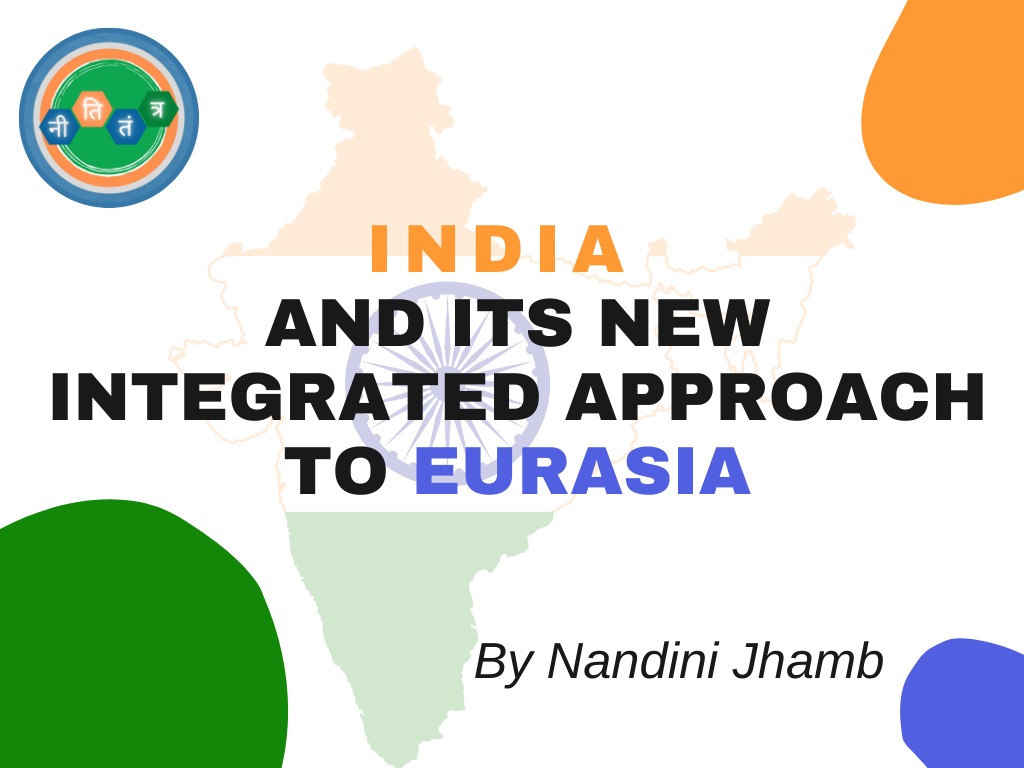With the withdrawal of the U.S. from Afghanistan, it becomes imperative for India to have a new, unified approach to its diplomacy and showcase similar energy to the Eurasian region as it did with the Indo Pacific Strategy. India’s Indo-Pacific Strategy has opened many doors for trade, investments, and commerce. It has also strengthened the marine boundaries, formed military alliances, and fostered a sense of safety and security in the maritime domain.
While this has garnered some political attention and generated some traction at institutional levels, it only focuses on the maritime geopolitical climate. With the challenges created by religious extremism and terrorism, the importance of revising the policies regarding Eurasia and Central Asia has increased considerably. It is time that India covers all its bases and focuses on continental strategy.
The Eurasian region is rich in natural resources, especially energy resources. It is also abundant in iron ore and uranium. The area is well known for significant production and exports, making it pivotal for its economy. It is also great in iron ore and uranium.
The Eurasian region has gained prominence among many countries. While many nations claim to define the Eurasian region, The precise definition of the Eurasian landmass remains unclear. Earlier, Russia, the heartland of Eurasia and Central Asia, dominated the area. However, after the soviet union (USSR) fell in 1991, many other countries like China, Iran, the U.S.A., etc., have asserted control. Eurasia comprises mainly the central Asian region and nearby countries that connect Asia and Europe regarding geopolitics.
India’s relationship with Eurasia dates back to the Buddhist era. Ancient civilizational links with Eurasia like the Sanghas and Shrines generated lasting interactions between the two regions. The colonial period saw an outward projection of India’s influence in Central Asia. Many Indian nationalists turned to Europe to secure the nation’s freedom from the British Raj. After the independence, India diverted all its attention to form an alliance with Russia which resulted in India neglecting the importance of Eurasian policies.
The U.S. withdrawal from Afghanistan and the Taliban coming into power has caused severe regional turmoil and safety threats amongst countries. India has made huge investments and commitments and cultivated economic and defense ties with the Afghan government. It needs to protect its assets, prevent Afghanistan from becoming another haven for anti-India terrorist groups, and check Pakistan’s deepening influence in Kabul.
The Partition of India and Pakistan further isolated India from Eurasian geopolitics. Pakistan acts as a barrier towards continental connectivity of India with the Eurasian region. If India wants to set a firm foothold in Eurasia, it needs to overcome the geographical constraint imposed by Pakistan. Furthermore, In the recent Delhi Regional Security Dialogue on Afghanistan, Ajit Doval, the National Security Advisor, invited Pakistan, Iran, Central Asia, Russia, and China to join this conference. However, Pakistan’s decline to attend reveals the ever-known rivalry with India and the urgency to recalibrate the Eurasian strategy.
China rising to power is an alarming threat to many nations, especially India. China has been expanding and asserting control over the Eurasian region. As the second-largest economy globally, China’s commercial and economic influence is felt by many countries. The physical proximity to the inner Asian and Eurasian areas and Europe’s economic interdependence on China further intensify its growth and power. Over the years, the disputes between China and India have made revising Eurasian geopolitics even more critical. China’s territorial claim of the borders of Bhutan and India, the assertion in the affairs of the broader sub-Himalayan region, and association with Pakistan have further strained the Indo-China relationship.
China is actively looking for more power in Afghanistan. Along with Pakistan, It wants to recognize the Taliban. With China-Taliban engagement, a new regional geopolitical union between China-Pakistan-Taliban can form, which may go against the interests of India. China’s stronghold in Afghanistan can also interfere with the projects that connect Central Asia via Afghanistan, such as the TAPI Line and the Chambahar Project. It is coming into power with its Belt and Road Initiative that paves the way to Eurasia through its New Silk Road Economic Belt.
To construct a role in the Eurasian region, India has to build effective coalitions with neighboring nations, amend policies and resolve conflicts. Cooperation regarding connectivity with the member countries can be pursued through the Shanghai Cooperation Organisation(S.C.O.) framework. It may also need to repair its relations with Iran. India’s relationship with Iran and Saudi Arabia is also essential to overcome Turkey’s alliance with Pakistan that is animus towards Delhi.
India must work out the recent differences on the Quad, China, Taliban, and the Indo Pacific strategy with Russia. Russia’s links with the Taliban in recent years can be crucial for India as It would need Russia’s support to contact the Taliban. Apart from the INSTC ( International North-South Transport Corridor) and Chabahar Port in Iran that are crucial for India’s proposed economic partnership with the Eurasian Economic Union (E.E.U.), India should also seek to join Russia’s “Greater Eurasian” corridor and the Northeast Passage that will link the Far East and even Japan.
India needs to strengthen its connections with Europe and have strategic discussions with Brussels regarding Eurasian security. The policies must aim at a greater engagement with the European Union and the North Atlantic Treaty Organisation. A dedicated military office in the Indian mission to Brussels will be the crucial step for supporting security dialogue with Europe.
The Eurasian region plays a pivotal role in achieving India’s goal to become an Economic Hub.
India must strengthen its geoeconomic relations with European and central Asian nations. Europe has the capital, power, and other resources to shape Eurasia. India is also heavily dependent on the Gulf region for oil. Moreover, the religious, ethnic, and cultural linkages among the middle eastern countries make them a prominent player in the Central Asian region and Afghanistan. This makes it essential for India to build coalitions with them. Improving connections with middle eastern countries like the U.A.E., Israel, and Saudi Arabia can help frame India’s geopolitical plans.
The key for India to come to power and gain control lies in its geopolitical and geoeconomic blueprint. For being dominant in the Eurasian and Central Asian region, It must focus on realigning, recalibrating, and reviewing policies. India must adopt an integrated approach towards Eurasia to open opportunities in all domains.


📌Analysis of Bills and Acts
📌 Summary of Reports from Government Agencies
📌 Analysis of Election Manifestos

